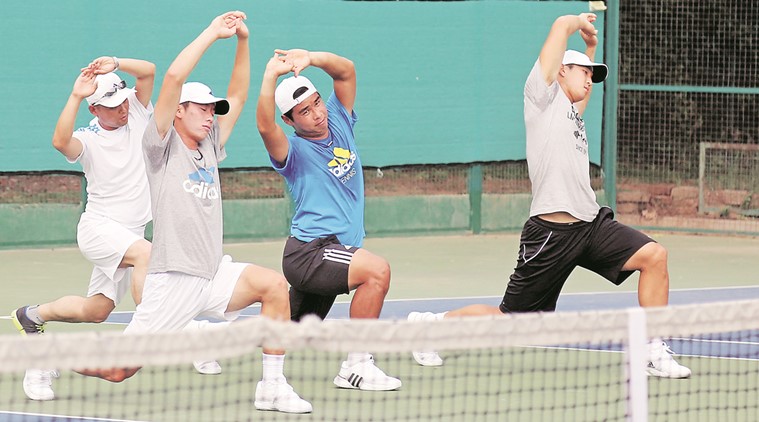 South Korea Tennis players during practice session for their upcoming Devis Cup match between India at Chandigarh Club on Thursday. (Express Photo/Kamleshwar Singh)
South Korea Tennis players during practice session for their upcoming Devis Cup match between India at Chandigarh Club on Thursday. (Express Photo/Kamleshwar Singh)
A small crowd gathered around the practice courts of the Chandigarh Club moments before South Korea could begin their practice. The curiosity over the visiting team was understandable, considering most of their players are rather unknown names here. But the Koreans needed their space.
Before they began practice, South Korea’s non playing captain Gap-taik Ro and playing captain Yong Kyu Lim were quick to tell the team’s Indian manager they are not comfortable practising in front of the crowd and the officials told the staff to dispel. Perhaps it was to avoid any distraction. But practicing behind closed doors would also ensure their game-plan for the crucial Davis Cup Asia/Oceania second round tie remains a secret, so as to surprise favourites India during the three-day tie starting July 15.
South Korea have reached here more than a week in advance to familiarise themselves to the conditions. India, who will be without their top two singles players Somdev Devvarman and Yuki Bhambri for the tie, have carefully chosen the grass courts of Chandigarh Club as the venue. Koreans are used to playing on hard courts. But none of their players have ever played on grass during their senior careers, and it’s something that’s playing on their mind.
Surface tension
“We have not yet played on the grass court and the next few days will be important for us. We play on hard court and synthetic courts back home. We do not have too many grass courts in Korea and this will be the first time that our senior team will be playing on grass court,” Ro told The Indian Express on Thursday. “Most of them have played on grass courts at the junior level. The major difference is the bounce and speed of the ball which we have to judge on grass courts and the players will be keen to adjust to that before the draw takes place next week. The courts here look good and the players will be keen to utilise whatever time they get to train here.”
South Korea hold a superior 6-4 head-to-head record against India in the Davis Cup but their last win came in 2013 Asia/Oceania quarterfinal when the Suk Young Jeong led side scored a 4-1 win at hard courts in Delhi. India, however, avenged that loss in 2014 when they returned with a 3-1 win over hard court in Korea. Another factor that may have played a part in AITA choosing grass courts is that Korea’s last win on this surface in India came in 1989 at Bharuch.
The Korean side is without the services of veteran Hyung Tak Lee, who has 51 wins for Korea in Davis Cup but the presence of captain Yong Kyu Lim will give them some respite, Ro hopes. “We could not bring our best players due to some reasons. But whatever resources we have, we will give our best. Seong Chan Hong is ranked around 400 in the world and other players can also surprise the Indian team,” Ro added. “The youngest member of our team 18-year-old Yun Seong Chung has just joined us after playing in Wimbledon and he has shown some good performance at grass courts recently. Yes, the conditions will be tough with the weather being humid and hot and we already experienced this today.”
With India also fielding a second-string singles side, the doubles rubber will prove to be crucial. India hold an edge over the visitors in doubles, having won the last six matches. South Korea’s most memorable doubles win was way back in 1989 in Bharuch, when their legendary pair of J Yoo and B Kim beat Zeeshan Ali (India’s coach in this tie) and Mark Ferreira.
But Ro knows history will have little to do with regards to how this tie pans out. “We see Indian team as one of the best strong doubles team in Asia. The singles players are not that tough in terms of what we expected. Of course, Leander Paes still is a good player and he has been one of the greats in Asia and he plays doubles very well. He has won an Olympic medal and his experience always comes handy for the junior as well senior players. And we know that. The fact that Rohan Bopanna and Paes are playing together will also make Indian team strong,” signed off Ro.
![]()
